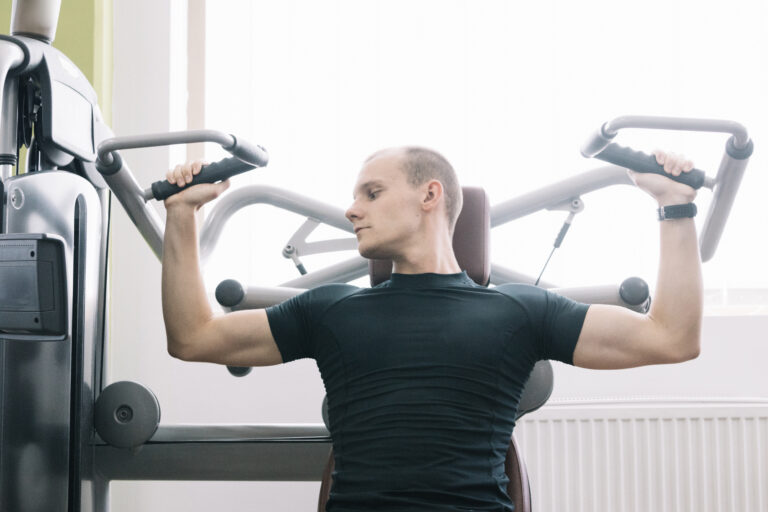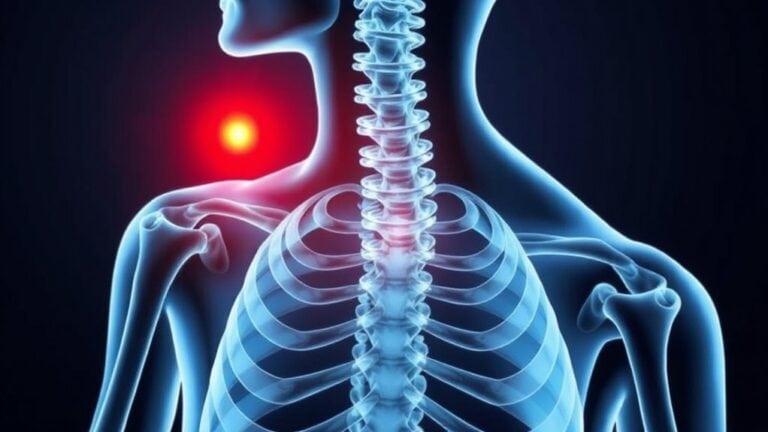Experiencing a muscle cramp under your chin can be both painful and troubling. These sudden spasms can make speaking or eating difficult. This article will explain the potential causes and offer effective relief methods you can try at home.
Key Takeaways
- Muscle cramps under the chin are caused by triggers such as stress, anxiety, dehydration, nutritional deficiencies, and poor posture, leading to discomfort and impact on daily activities.
- Effective management of muscle cramps includes hydration, dietary adjustments to address mineral deficiencies, gentle massage, and warm compresses.
- Professional treatments like physical therapy, medications, and botulinum toxin injections are available for persistent cases, while preventive measures include regular stretching, maintaining proper ergonomics, and stress management techniques.
What is Muscle Cramp Under Chin ?
Muscle cramps under the chin occur when the jaw muscles contract involuntarily, often causing pain and difficulty in moving the mouth. These cramps can feel like a hard ball is present under the chin and are typically temporary, lasting only a few minutes. Despite their brief duration, the discomfort they cause can be quite significant.
Common triggers for jaw cramps include excessive talking, chewing tough foods, or yawning. Nutritional deficiencies, particularly in minerals like magnesium and potassium, can lead to increased muscle spasms. Additionally, stress and fatigue can hinder the nervous system’s function, contributing to the occurrence of muscle cramps. Understanding these triggers is the first step in managing and preventing these painful episodes.
The occurrence of jaw cramps isn’t just a minor inconvenience; it can severely impact daily activities. Recognizing the sensations and triggers associated with these cramps allows for better management and prevention strategies. This understanding is key to alleviating the discomfort and maintaining a better quality of life.
Causes of Muscle Cramp Under Chin
Muscle cramps under the chin are a common condition that can lead to discomfort in the affected area. These cramps can cause severe discomfort, significantly affecting daily activities. The pain can radiate to nearby regions, such as the neck and ears, due to the interconnectedness of muscle groups in the neck. Understanding the causes of these cramps is crucial for effective prevention and treatment.
The primary common causes include stress and anxiety, dehydration, nutritional deficiencies, and poor posture. Each of these factors can contribute to muscle tension and cramps in different ways. Let’s delve into how each of these causes affects the jaw muscles.
Stress and Anxiety
Stress and anxiety are significant contributors to muscle tension, including cramps under the chin. When we are stressed, our body responds by tightening muscles, which can directly affect the jaw area. Practicing mindfulness techniques, such as meditation, can effectively lower stress levels and decrease muscle tension.
Practicing deep breathing exercise can alleviate muscle tension and prevent cramps. Stretching exercises can enhance muscle flexibility and reduce the likelihood of cramps. These practices help manage the physical effects of stress and anxiety.
Dehydration
Dehydration can contribute to muscle cramps. Hydration is crucial for muscle function, as it helps maintain electrolyte balance. Staying well-hydrated is a simple yet effective way to prevent cramps.
Nutritional Deficiencies
Electrolyte balance is crucial for muscle function. Minerals like potassium and magnesium in the diet play a key role in muscle contraction and relaxation. Deficiencies in these minerals may contribute to muscle cramps.
Dietary changes to address these deficiencies can help reduce the occurrence of cramps.
Poor Posture
Maintaining poor posture, especially while looking at screens for long periods, can lead to muscle strain in the neck and jaw areas. A slouched position can put extra strain on neck muscles, leading to discomfort or cramping. Extended use of electronic devices often contributes to muscle tension in the neck, exacerbating the problem.
Maintaining proper ergonomics and posture can prevent muscle strain. Paying attention to how you sit and use electronic devices can significantly reduce the risk of developing muscle cramps under the chin.
Symptoms of Muscle Cramp Under Chin
Muscle tension and pain in the jaw can be caused by various health conditions, including stress and anxiety. Tight jaw muscles and muscle cramps under the chin can lead to significant discomfort and may manifest as a hard ball sensation in the affected area. Recognizing these symptoms allows for timely intervention and relief.
Jaw cramps can cause significant discomfort, making it hard to open and close the mouth. These cramps can result in challenges in daily activities, including difficulty speaking or eating. Identifying involuntary muscle contractions and associated discomfort is key to recognizing tight jaw cramps.
Sharp Pain
Individuals experiencing muscle cramps often report sudden, intense pain localized to the area under the chin. This sharp pain can be severe and may make it challenging to perform daily activities.
The pain is often intense and localized, primarily affecting the temporomandibular joint area and causing jaw pain in the lower jaw, which can be a symptom of TMJ disorder and may require dental surgery. The most common symptoms may include discomfort in the jaw, including tmj disorders, and some may experience pain. Additionally, dental and craniofacial research continues to explore these conditions.
Tightness and Tension
During a cramp, individuals may feel a constricting sensation in the muscles beneath the chin and the anterior belly. This tightness and tension, along with clenching, can contribute to the sensation of discomfort involving the suprahyoid muscles, jaw tightness, and other symptoms.
A cramp can create a feeling of stiffness in the muscles, contributing to the overall sense of tightness.
Difficulty Moving Jaw
Muscle cramps can significantly hinder jaw movements, making actions like speaking or chewing quite challenging. Cramping can severely limit the ability to open or close the mouth slowly, complicating actions like talking or eating.
Diagnosing Muscle Cramp Under Chin
It’s important to monitor symptoms to determine if they necessitate medical evaluation. Keeping track of the frequency and intensity of cramps can aid in diagnosis. Consult a doctor if symptoms worsen. Conditions that may affect the digastric muscle include various myopathies, infectious myositis, and neuromuscular diseases.
Diagnosis typically involves a physical examination and, if needed, imaging tests. These steps identify the underlying cause and guide effective treatments.
Physical Examination
A physical examination is crucial for diagnosing muscle cramps under the chin. During the examination, a healthcare professional assesses muscle strength and tension and reviews the patient’s medical history.
X-ray and MRIs may be recommended if the physical examination suggests underlying structural issues.
Imaging Tests
Imaging tests are useful for diagnosing inflammation. They can also identify structural abnormalities. These tests identify underlying causes of muscle cramps. X-rays and MRIs can reveal structural issues that contribute to muscle cramps. Understanding these results helps develop an effective treatment plan.
At-Home Remedies for Relief
Staying hydrated prevents muscle cramps, as dehydration can lead to increased cramping. Adequate fluid intake maintains muscle function and reduces the likelihood of cramps. Incorporating gentle massage and warm compresses into your routine can also provide relief.
Adequate hydration, dietary changes, and physical therapy techniques are effective at-home remedies. These methods help manage and prevent muscle cramps by addressing common contributing factors.
Gentle Massage
Gently massaging the affected area can relieve tension and improve blood flow. Techniques such as pressing the tongue against the roof of the mouth while tilting the head back can help. Massaging the muscle helps improve circulation, aiding in recovery from cramps.
Gentle massage can gently massage be an effective way to manage and prevent muscle cramps.
Warm Compress
A warm compress can be an effective remedy for relaxing tight muscles under the chin. A warm compress alleviates muscle pain by relaxing tense muscles. Apply the warm compress for 15-20 minutes to maximize its benefits.
This method can be easily incorporated into your routine for soothing muscle cramps under the chew chin.
Hydration and Nutrition
Adequate hydration assists in muscle function and may help prevent cramps. Sufficient fluid intake is vital for effective muscle function and can help prevent cramps. A lack of essential minerals like magnesium and potassium can increase the frequency of muscle cramps.
Water-rich foods can support hydration levels and muscle health.
Professional Treatments
Persistent muscle cramps under the chin may require interventions that go beyond home remedies, including therapies that target underlying causes. Various professional treatments are available, such as physical therapy, prescription medications, and botulinum toxin injections. Professional interventions manage severe or persistent muscle cramps.
These treatments offer specialized care that at-home remedies may not address, providing targeted relief and improving overall muscle health.
Physical Therapy
Physical therapy plays a crucial role in helping individuals manage and alleviate muscle cramps under the chin. Regular stretching maintains muscle flexibility and strength, reducing muscle cramps.
Proper ergonomics reduce strain on neck muscles and prevent cramps.
Preventing Muscle Cramps Under Chin
Preventing muscle cramps under the chin involves a proactive approach to minimize the risk factors. Incorporating dynamic stretches before activities and static stretching afterward can enhance muscle flexibility and reduce the risk of cramps. Gentle stretching exercises can help prevent cramps under the chin while yawning.
Heat therapy can enhance blood circulation in the jaw area, which aids in pain relief and muscle relaxation. Engaging in physical therapy can enhance neck muscle strength, improve flexibility, and promote better postural alignment, potentially alleviating muscle cramps.
These preventive measures maintain optimal muscle health.
Regular Stretching
Regular stretching exercises are crucial for maintaining muscle flexibility. Stretching keeps muscles flexible and reduces tension, helping to prevent cramps. Proper ergonomics, especially while working, alleviate tension in neck muscles and prevent cramps.
Relaxation techniques to manage stress can minimize muscle tension, preventing cramps.
Proper Ergonomics
Maintaining a good posture while sitting at a desk can prevent strain on neck muscles and reduce the risk of cramps. A neutral neck position while working can prevent muscle strain.
Adjusting your chair and monitor height can prevent neck strain and reduce cramps. An ergonomically sound workstation can significantly reduce the risk of muscle cramps.
Stress Management
Stress and anxiety can significantly impact physical health by increasing muscle tension in various areas of the body. Increased muscle tension due to stress and anxiety can lead to painful muscle cramps under the chin.
Relaxation techniques like deep breathing, meditation, and yoga alleviate stress and reduce muscle tension. These practices maintain overall well-being and prevent muscle cramps.
Frequently Asked Questions
What causes muscle cramps under the chin?
Muscle cramps under the chin are primarily caused by stress and anxiety, dehydration, nutritional deficiencies, and poor posture. Addressing these factors can help alleviate the cramps effectively.
How can I relieve muscle cramps under my chin at home?
To relieve muscle cramps under your chin at home, stay hydrated, gently massage the area, apply a warm compress, and ensure you have adequate intake of minerals like magnesium and potassium.
When should I see a doctor for muscle cramps under my chin?
You should see a doctor for muscle cramps under your chin if the symptoms worsen or persist despite at-home remedies. Keeping a record of the frequency and intensity of the cramps can be beneficial for diagnosis.
Can poor posture really cause muscle cramps under the chin?
Indeed, poor posture, particularly when using electronic devices, can strain the neck and jaw muscles, resulting in cramps under the chin. Addressing posture can alleviate these issues.
What professional treatments are available for persistent muscle cramps under the chin?
Professional treatments for persistent muscle cramps under the chin include physical therapy, prescription medications like muscle relaxants and anti-inflammatory drugs, as well as botulinum toxin injections to alleviate chronic muscle spasms.





